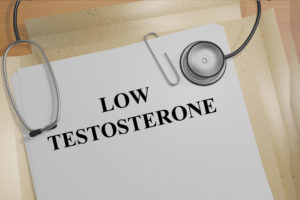
Low testosterone can be caused by a variety of things.
Image: Shutterstock
One of the sneakiest culprits behind erectile dysfunction is low testosterone. I say “sneaky” because low testosterone can cause a plethora of problems when it comes to both your general health and specifically how happy Mr. Happy actually is. That makes it tricky to diagnose and treat. But it is possible, particularly if you take a holistic view.
The connection seems easy at first: low testosterone means less of this all important sex hormone, which means less sexual desire, which means getting and maintaining an erection is harder.
But low testosterone can also cause a general reduced sex drive, anxiety, irritability, difficulty concentrating, and depression. So deducing the specific illness and how to treat it can be tricky.
Low testosterone can be caused by a variety of health issues, including high blood pressure, high cholesterol, pituitary or thyroid issues, kidney problems, obesity, steroid exposure, type 2 diabetes, and many more. It can start as a problem with the testicles or even with signals from the brain that aren’t getting through quite right.
And it’s not necessarily an illness, either; as men age, they naturally produce less testosterone over time. According to the American Association of Clinical Endocrinologists, about 30% of men over age 75 have low testosterone.
If a qualified doctor has run tests and determined that low testosterone is the underlying issue, treatment is absolutely possible. You may have heard of testosterone replacement therapy (TRT) for erectile dysfunction.
“Clinical research data has explored the influence of testosterone replacement therapy on erectile dysfunction and found that in many men with identified low testosterone, testosterone replacement therapy can provide a positive influence on erectile function,” says J. Aaron Davis, ND, director of the Low T Center in Indianapolis. In some cases, TRT alone may solve the problem; in more severe cases, however, treatment requires a combination of efforts, including TRT, lifestyle changes, and medication.
There are actually two kinds of low testosterone: primary and secondary. Primary is caused by a problem with the testicles, such as:
- Undescended testicles. If a young boy’s testicles don’t descend from his abdomen into the scrotum and the situation isn’t fixed early on, the testicles can malfunction and have problems producing testosterone.
- Klinefelter syndrome. Sometimes a boy is born with an extra X chromosome, which causes the testicles to develop abnormally. The National Institutes of Health (NIH) says one in 500 men suffer from this problem.
- Mumps orchitis. If you had mumps after puberty and the infection reached your testicles, they may produce less testosterone over time even after you’ve recovered.
- Too much iron being absorbed into the body—one of the side effects of hemochromatosis—can affect testosterone production.
Secondary causes of low testosterone originate in the brain—the hypothalamus and pituitary gland, to be precise. These kinds of problems include:
- Kallmann syndrome. This genetic disorder means delayed puberty—or even no puberty at all. One result of the syndrome is reduced testosterone production.
- Pituitary disorders. Given the importance of the pituitary gland in regulating hormones, if something is wrong, it can easily lead to low testosterone.
- Inflammatory disease. Diseases like sarcoidosis (inflammation of tissues, particularly the lungs), histiocytosis (overproduction of white blood cells), and tuberculosis can affect the hypothalamus and pituitary gland, leading to low testosterone.
- Obesity and stress. Your habits can have a big effect on your testosterone production. Things like obesity and stress have been shown to lower testosterone levels in some cases.
Erectile dysfunction may not be your favorite topic at dinner parties, but it’s definitely something you want to discuss with your doctor. If low testosterone is behind it, there are steps you can take to treat the underlying situation and get back to optimal health—not to mention fun in the bedroom.
